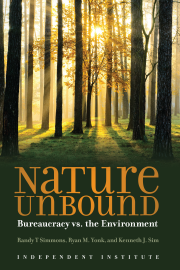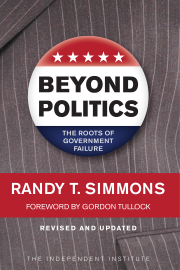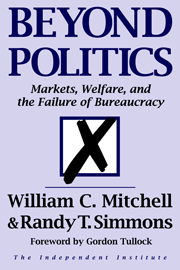Free and unregulated access to scarce resources has long been recognized as a serious problem. Two thousand years ago Aristotle wrote: What belongs in common to the most people is accorded the least care: they take thought for their own things above all.1 More recently, the biologist and human ecologist Garrett Hardin argued: Ruin is the destination toward which all men rush, each pursuing his own best interest in a society which believes in the freedom of the commons. Freedom in a commons brings ruin to all.
Fortunately, however, there are ways to avoid such ruin.
Hardin used an example of a pasture to illustrate how the commons can produce tragedy. As long as grazing on the commonly owned pasture is below carrying capacity, each herdsman may add another cow without harming any cows-they all still have enough to eat. But once carrying capacity is reached, adding the additional cow has negative consequences for all users of the common pasture.
The rational herdsman faced with adding the extra cow calculates his share of the benefits of an additional cow. It is 100 percent. He also calculates his share of the cost. It is 1/n herdsmen; that is, it is the cost divided by the number of herdsmen. So he adds another cow. And another . . . as do all the other herdsmen. Each may care for what is common but can do nothing about it, since one person exercising restraint only assures himself a smaller herd, not a stable, preserved commons.
Thus, the commons is a trap-an individual acting in his self-interest makes himself, along with everyone else, worse off in the long run. Yet acting in the group interest cannot stop the inevitable ruin.
If the commons inevitably leads to tragedy, humans should have killed themselves off thousands of years ago. Instead, people developed ways of making individuals responsible for their own actions.
Responsibility is created by moving people out of a system of open access and creating rights of access and use. Creating such use-rights, therefore, means that a resource is no longer everybody’s property. But use-rights are meaningless unless they are protected or enforced with some degree of legal or customary agreement.
The most effective system of responsibility is private property rights because owners are responsible for their own costs and benefits. If you degrade your own property, you suffer the consequences because your wealth is reduced. If, instead, you improve the property, your wealth is increased. You capture the benefits of your actions and pay the costs of them as well. The only exception is when you create costs to others by what you do on your own property, such as damming a stream or polluting the air. Legal institutions not only protect people’s rights to do what they want with their property but also protect the rights of others (third parties) to be free from harm caused by others.
Customary Institutions
People have developed other systems of responsibility that, unlike property rights, do not require the legal institutions of the state to make them effective. Customary institutions allow Maine lobstermen, for example, to defend their fishing territories from outsiders and successfully enact informal and formal regulations on the number of traps and the amount of fishing pressure on the lobster resource. Swiss villagers typically own private hayfields and pastures surrounding their village, but high Alpine meadows are owned and used by the whole village. Customs have evolved that determine the intensity and frequency of use. Some African pastoralists hold grazing lands in common when there is plenty of forage, but when forage is scarce village elders allocate grazing rights to individual families.2 Each of these systems falls short of pure property rights solutions to the commons but each effectively allocates responsibility.
Another approach has been tried, too: political management of a commons. That means that the users collectively make decisions about management, either democratically or by submitting to authoritarian decision-making. However, this approach is inherently irresponsible.
Political managers do not capture the benefits of decisions that increase the wealth of their society, nor do they pay the costs of decisions that reduce wealth. True, as members of the society they gain their proportional share from good or bad decisions. But their share of loss or gain is so small that it approaches zero.
Under political management, users, too, are protected from responsibility. Because the costs of decisions are shared collectively, there is a tendency for individuals to act like the herdsman with cows in the commons—to seek benefits for oneself regardless of the costs to others. Wants can be presented as needs, information about the effects of one’s actions can be suppressed, and the preferences of the politically able can substitute for sound management choices.
Rather than overcoming the tragedy of the commons, political management institutionalizes the core problem. In the irresponsible political environment, rules and choices will be structured to benefit the politically powerful, not to benefit the human or natural environment. The formerly communal forests of India, Nepal, Niger, and Thailand are well-known examples. Stable, customary use-rights had prevented the tragedy of the commons. But these were replaced by political controls imposed by national governments. The results were disastrous levels of deforestation and soil erosion, as villagers were released from their culturally and communally enforced use-rights and responsibilities.
If societies are to protect scarce resources, including human liberty, systems of responsibility must be protected, encouraged, and implemented. No one system fits every situation. Cultural, customary, or informal arrangements are often the most appropriate. Sometimes de facto as opposed to de jure use-rights are best. Other times, pure property rights will be preferred. It is important, however, that governments not impose solutions on local people. Local institutions reflect an evolved wisdom that may not be apparent to policymakers who wish to impose political control or privatization.
Notes:
1. Aristotle, The Politics, translated by Carnes Lord, Book 2, Chapter 3 (Chicago: University of Chicago Press, 1984), p. 57.
2 .For more discussion and examples of customary rights, see Terry L. Anderson and Randy T. Simmons, The Political Economy of Customs and Culture (Lanham, Md.: Rowman & Littlefield, 1993).
Law, Custom, and the Commons
Also published in The Freeman
This article is reprinted with permission from The Freeman, February 1997. © Copyright 1997, the Foundation for Economic Education.
Randy Simmons is a Senior Fellow at the Independent Institute, and Professor of Economics at Utah State University.
Economic History and DevelopmentEconomyEnergy and the EnvironmentLaw and LibertyNatural ResourcesProperty Rights, Land Use, and ZoningRegulation
Comments
Before posting, please read our Comment Policy.












